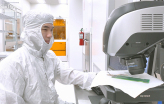Real-time Readout of Neurochemical Activity
Scientists have created cells with fluorescent dyes that change color in response to specific neurochemicals. By implanting these cells into living mammalian brains, they have shown how neurochemical signaling changes as a food reward drives learning, they report in Nature Methods online October 26.















